As a proud Rottweiler owner, you know that these loyal and intelligent dogs make wonderful companions. However, with their naturally muscular and robust build, it’s crucial to keep a close eye on their weight and overall health. Maintaining an optimal weight for your Rottweiler not only enhances their quality of life but also helps prevent numerous health issues down the road. If you’ve noticed that your beloved Rottweiler seems a bit on the skinny side, it’s essential to address the issue promptly. In this blog, we’ll dive deep into the world of Rottweiler weight management, helping you understand the ideal weight ranges, how to identify “is my rottweiler skinny?”, potential causes, and practical tips to ensure your canine companion thrives in a happy and healthy life.
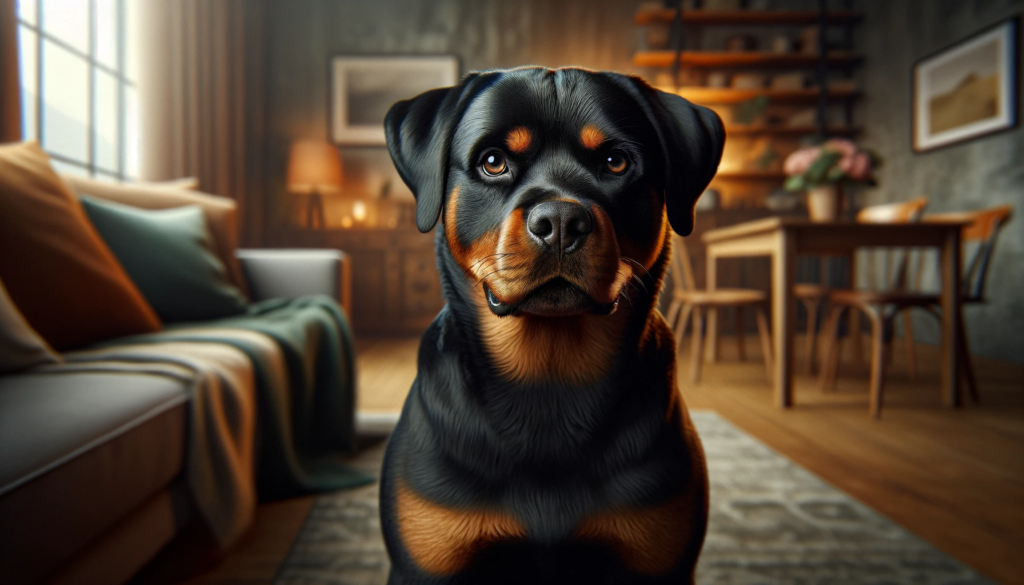
Rottweiler Weight Guide: Ideal Weight Ranges and Factors to Consider
To accurately gauge if your Rottweiler is underweight, it’s crucial to familiarize yourself with the breed’s ideal weight range and the factors that influence their overall size. Rottweilers are renowned for their powerful, muscular frames. It’s important to remember that every dog is an individual. Their weight is affected by aspects such as age, gender, genetics, and overall health. In this section, we will explore the typical weight ranges for both male and female Rottweilers. We will also delve into the critical factors that could impact your dog’s weight. Armed with this information, you’ll be better equipped to determine if your Rottweiler is indeed too skinny. You will also be able to make well-informed decisions regarding their health and well-being.
Average Weight Ranges for a Healthy Rottweiler
Just like humans, every Rottweiler is unique and may fall within different weight ranges. However, there are general guidelines that can help you determine if your dog’s weight falls within a healthy range for their breed. Typically, a male Rottweiler weighs between 95 to 135 pounds. A female Rottweiler weighs slightly less, ranging from 80 to 100 pounds. Keep in mind that these numbers are not set in stone, and individual dogs may vary.
It’s important to remember that a healthy weight for your Rottweiler should be based on more than just the number on a scale. Observing your dog’s overall appearance, energy levels, and muscle mass can also provide valuable insight into their overall health. A healthy Rottweiler should have a strong, muscular build with a well-defined waist. They should have a slightly visible outline of the ribs when viewed from the side.
As you assess your Rottweiler’s weight, keep in mind that factors such as age, activity level, and general health can impact their ideal weight range. A young, active Rottweiler may weigh less than an older, less active dog, but still be perfectly healthy. The key is to focus on a combination of factors, including appearance, energy levels, and overall well-being. This will ensure your Rottweiler is maintaining a healthy weight.
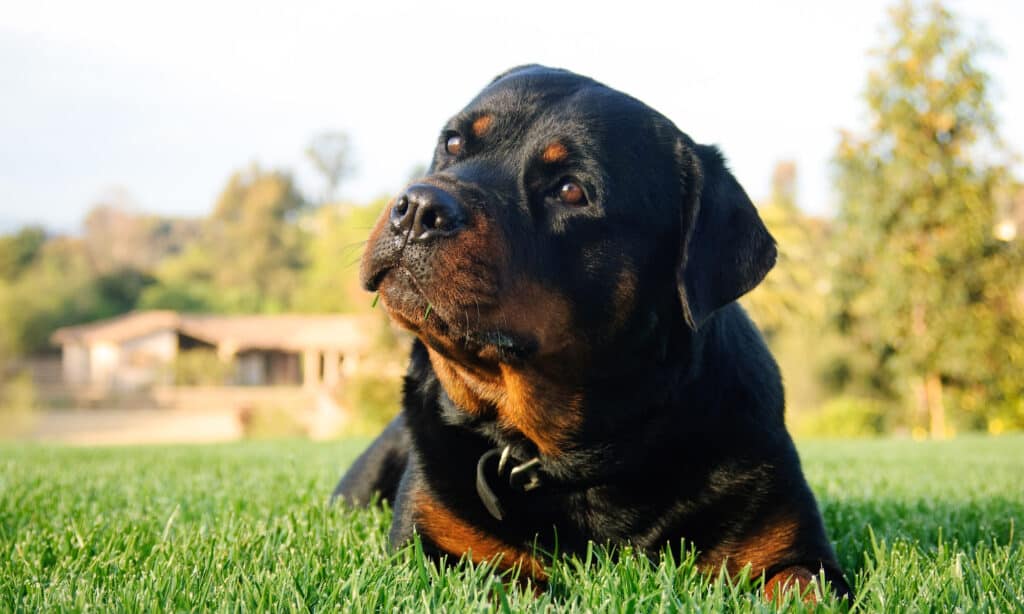
Key Factors Affecting Your Rottweiler’s Weight
Understanding the factors that play a role in determining your Rottweiler’s weight is crucial for maintaining their health and well-being. Several elements can influence your dog’s weight. Being aware of these factors will help you make better decisions regarding their care.
- Age: A Rottweiler’s age can significantly impact their weight. As puppies and younger dogs tend to be more active and have a faster metabolism. As your Rottweiler grows older, their metabolism may slow down, and they may become less active. This can lead to potential weight gain if their diet isn’t adjusted accordingly.
- Gender: Male and female Rottweilers have slightly different weight ranges, with males typically being heavier than females. Keep in mind that each dog is unique. It’s essential to consider their individual needs when assessing their ideal weight.
- Genetics: Just like humans, dogs can inherit genes from their parents that may affect their size and weight. Some Rottweilers may naturally be leaner or more muscular than others.
- Activity Level: A Rottweiler’s activity level can greatly impact their weight. Highly active dogs require more calories to maintain their energy levels. Less active dogs need fewer calories to prevent weight gain. Ensuring your Rottweiler gets regular exercise and adjusting their diet based on their activity level is key to maintaining a healthy weight.
- Overall Health: Various health conditions can affect your Rottweiler’s weight, such as thyroid issues, digestive disorders, or even chronic stress.
By keeping these factors in mind, you’ll be better equipped to manage your Rottweiler’s weight effectively, ensuring they remain happy and healthy throughout their life.
Genetics and Age: Understanding Their Impact on Rottweiler Weight
As a responsible Rottweiler owner, it’s important to recognize the roles genetics and age play in determining your dog’s weight. Gaining a clear understanding of how these factors influence your Rottweiler’s size will help you provide the best possible care. It will also ensure they maintain a healthy weight throughout their life.
Genetics: Just as with humans, a Rottweiler’s genetics can have a significant impact on their weight and body composition. Each dog inherits traits from their parents, which can influence their natural build, metabolism, and predisposition to certain health conditions. Some Rottweilers might naturally be more slender or muscular than others due to their genetic makeup. It’s crucial to take your dog’s individual genetics into account when assessing their ideal weight. As a one-size-fits-all approach may not apply.
Age: A Rottweiler’s age is another essential factor that affects their weight. Puppies and younger dogs are generally more active, with faster metabolisms, which can contribute to a leaner appearance. As your Rottweiler ages, their metabolism may slow down, and their activity levels might decrease. This change can lead to weight gain if their diet isn’t adjusted to accommodate their changing needs.
It’s important to monitor your Rottweiler’s weight as they grow and age. That way you can make any necessary adjustments to their diet and exercise routine. Regular checkups with your veterinarian can also help you keep track of your dog’s weight and overall health. This will ensure any potential issues are addressed early on.
By considering both genetics and age when assessing your Rottweiler’s weight, you’ll be better equipped to manage their health effectively. Remember, every dog is unique, and understanding your Rottweiler’s individual needs is key to providing the best care possible.
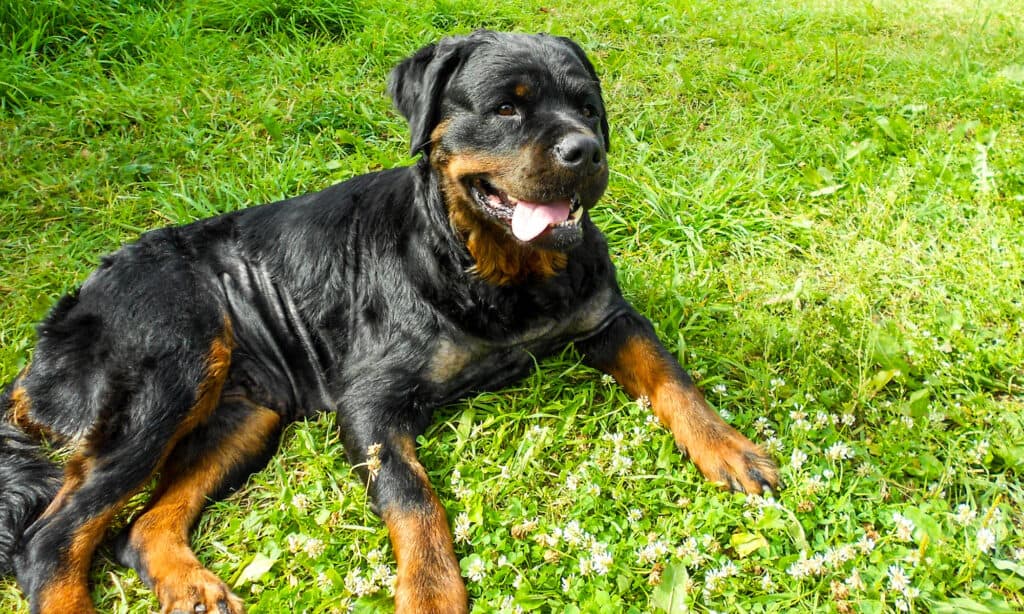
Identifying a Skinny Rottweiler: Signs and Symptoms
Recognizing the signs of an underweight Rottweiler is a critical aspect of ensuring your dog’s overall health and well-being. A skinny Rottweiler may be more susceptible to illness, injury, and a decreased quality of life. In this section, we will discuss the various signs and symptoms that may indicate your Rottweiler is too skinny. We will also discuss how to assess their body condition properly. By familiarizing yourself with these indicators, you’ll be better prepared to address any potential weight issues and take the necessary steps to help your Rottweiler regain a healthy weight. Remember, early intervention is key to preventing long-term health problems and ensuring your canine companion enjoys a happy, fulfilling life.
Visible Ribs, Spine, and Hip Bones: Warning Signs to Look For
One of the most apparent indicators that your Rottweiler may be underweight is the visibility of their ribs, spine, and hip bones. While a healthy Rottweiler should have a slightly visible outline of their ribs when viewed from the side. An underweight dog will have more pronounced ribs that are easily seen and felt with minimal pressure. Similarly, if your Rottweiler’s spine and hip bones are visibly protruding, it may be a sign that they’re too skinny.
It’s important to regularly assess your Rottweiler’s body condition by running your hands gently along their ribcage, spine, and hips. A healthy dog should have a thin fat layer over these areas, offering cushioning between their skin and bones.
Keep in mind that every dog is unique, and some Rottweilers may naturally have a leaner build due to factors like genetics and age. However, if you notice a sudden change in your dog’s appearance or if their bones become more prominent over time, it’s essential to address the issue promptly and seek professional guidance to ensure your Rottweiler’s health is not at risk.
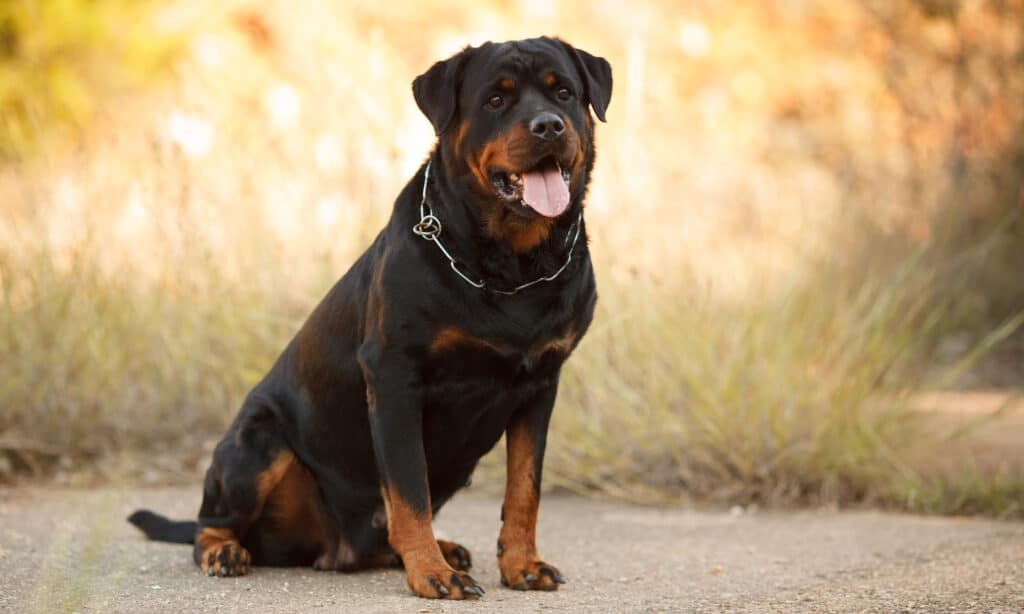
Lack of Muscle Mass: How to Assess Your Rottweiler’s Physique
Rottweilers are known for their strong, muscular build, which is an essential characteristic of the breed. A lack of muscle mass may indicate that your Rottweiler is underweight or experiencing health issues that require attention. Here’s how you can assess your Rottweiler’s physique to ensure they’re maintaining a healthy muscle mass:
- Observe their overall appearance: Stand back and take a good look at your Rottweiler from various angles. A healthy Rottweiler should have a well-proportioned, muscular body with a distinct waistline when viewed from above. If your dog appears thin, with little muscle definition, it may be a sign that they’re underweight.
- Feel for muscle tone: Gently run your hands along your Rottweiler’s body, paying particular attention to their shoulders, chest, and hindquarters. You should be able to feel firm, well-developed muscles beneath the skin. If your dog’s muscles feel soft or underdeveloped, it could indicate a lack of muscle mass.
- Assess their strength and stamina: A Rottweiler with a healthy muscle mass should display good strength and stamina during exercise and play. If your dog tires easily or struggles with activities they once enjoyed, it may be a sign that they’re losing muscle mass and require intervention.
- Monitor changes over time: Regularly assess your Rottweiler’s physique and take note of any changes in their muscle mass.
Remember, maintaining a healthy muscle mass is crucial for your Rottweiler’s overall well-being. By regularly assessing your dog’s physique and addressing any concerns promptly, you can help ensure your canine companion stays strong, healthy, and happy throughout their life.
Low Energy Levels: When Lethargy Indicates a Problem
While it’s normal for dogs to have occasional lazy days, consistently low energy levels may signal a problem in your Rottweiler. It’s essential to pay attention to your dog’s energy levels and behavior. Lethargy could indicate an underlying issue that requires attention. Let’s discuss when low energy levels might point to a problem and what to look for:
- Sudden change in energy: If your usually active Rottweiler suddenly becomes lethargic and uninterested in their favorite activities, it could be a sign that something is amiss. This change in energy levels could be due to various factors, including being underweight, illness, or even emotional stress.
- Persistent lethargy: Occasional tiredness is normal, but if your Rottweiler consistently displays low energy levels or seems uninterested in exercise and play, it might indicate a more serious issue. Underweight dogs often lack the energy required for daily activities, which can result in lethargy.
- Decreased stamina: A healthy Rottweiler should have good endurance during exercise and play. If you notice your dog tiring easily or struggling to keep up with their normal routine, it could be a sign that they’re underweight or experiencing other health problems.
- Behavioral changes: In addition to low energy levels, an underweight Rottweiler may also display other behavioral changes. These include irritability, restlessness, or disinterest in food. Keep an eye on your dog’s overall behavior, as it can provide valuable insight into their well-being.
If you’re concerned about your Rottweiler’s energy levels, it’s crucial to consult your veterinarian for a thorough examination and evaluation. They can help determine if your dog is underweight or if there are other underlying causes for their lethargy. By addressing these issues early on, you can help ensure your Rottweiler enjoys a happy, healthy, and energetic life.
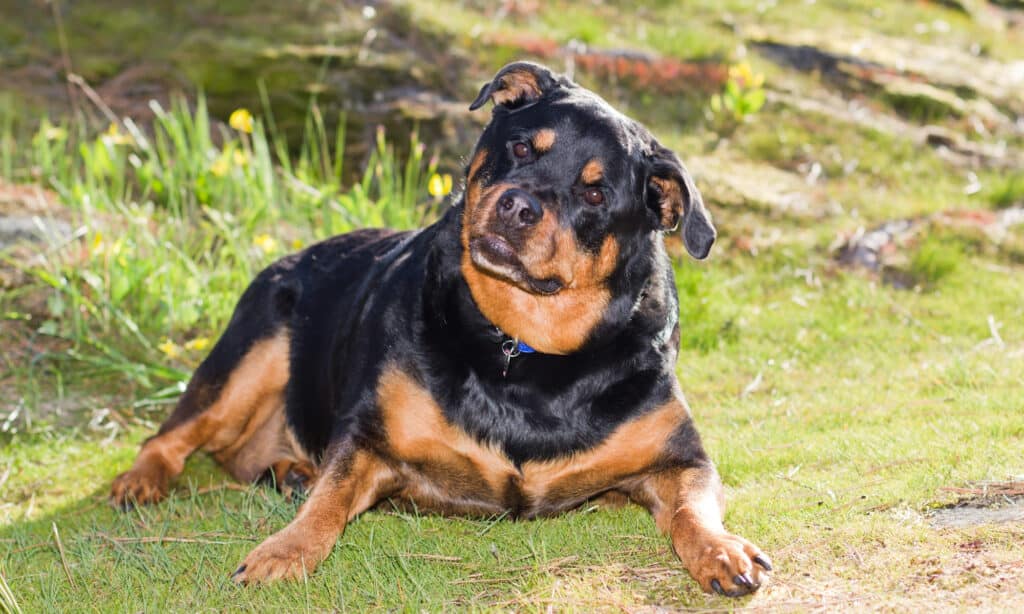
Rottweiler Body Condition Score: A Helpful Tool for Assessment
When assessing your Rottweiler’s weight and overall health, a valuable tool to use is the Body Condition Score (BCS). The BCS is a standardized system that helps pet owners and veterinarians visually evaluate a dog’s body condition. This makes it easier to determine if your Rottweiler is underweight, overweight, or at an ideal weight. Here’s what you need to know about the BCS and how it can help you assess your Rottweiler’s health:
- Understanding the BCS scale: The Body Condition Score typically uses a scale of 1 to 9, with 1 representing an emaciated dog and 9 being an obese dog. An ideal score for a Rottweiler is between 4 and 5. This indicates a healthy, well-proportioned body with an appropriate amount of fat and muscle.
- Assessing your Rottweiler’s BCS: To evaluate your dog’s BCS, start by observing their overall appearance. Look for a visible waistline when viewed from above and a slightly tucked abdomen when viewed from the side. Gently feel their ribs, spine, and hip bones, which should have a thin layer of fat covering them. Additionally, assess your Rottweiler’s muscle mass, strength, and energy levels.
- Identifying potential weight issues: A Rottweiler with a BCS of 1 to 3 may be considered underweight. They will show prominent bones, little to no fat, and a lack of muscle mass.
Using the Body Condition Score as a tool for assessing your Rottweiler’s weight can help you make informed decisions about their diet, exercise, and overall care.
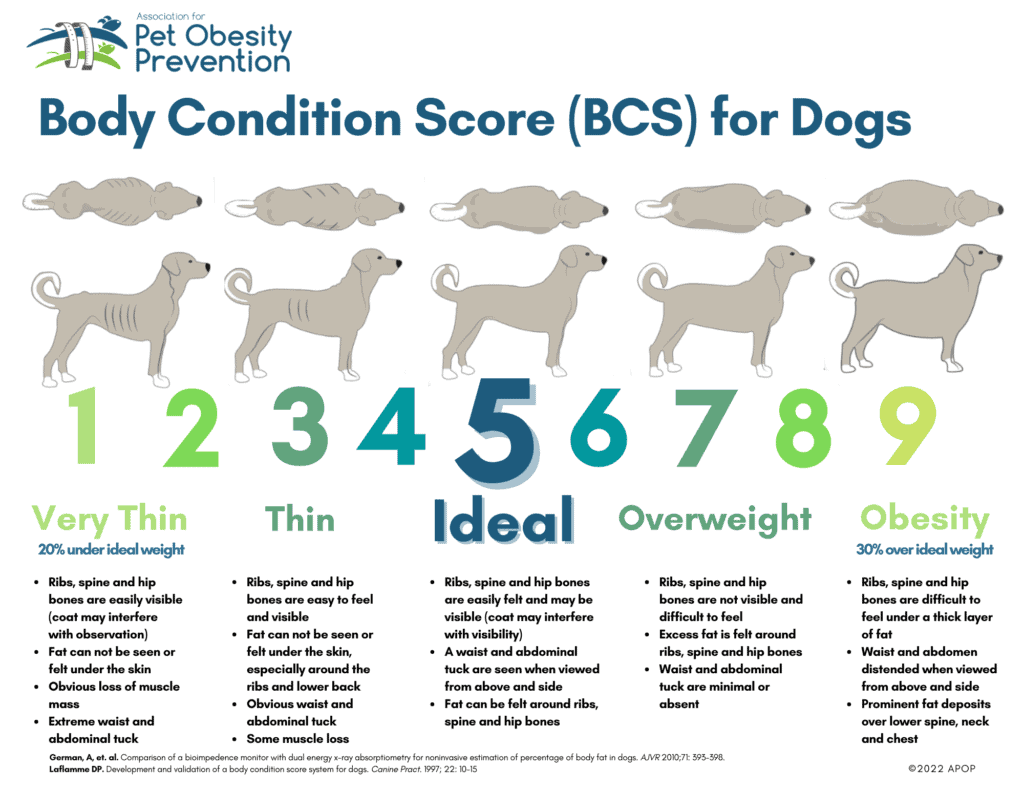
Uncovering the Causes: Why Your Rottweiler Might Be Skinny
If you’ve determined that your Rottweiler is indeed underweight, it’s essential to uncover the root cause of their weight loss or inability to maintain a healthy weight. There are numerous factors that could contribute to your Rottweiler’s skinny appearance, ranging from dietary issues to underlying medical conditions. In this section, we will delve into the possible causes of your Rottweiler’s weight loss. We will also discuss the importance of working closely with your veterinarian to address these issues. By understanding the reasons behind your Rottweiler’s weight loss, you can develop a targeted plan to help them regain a healthy weight and improve their overall well-being.
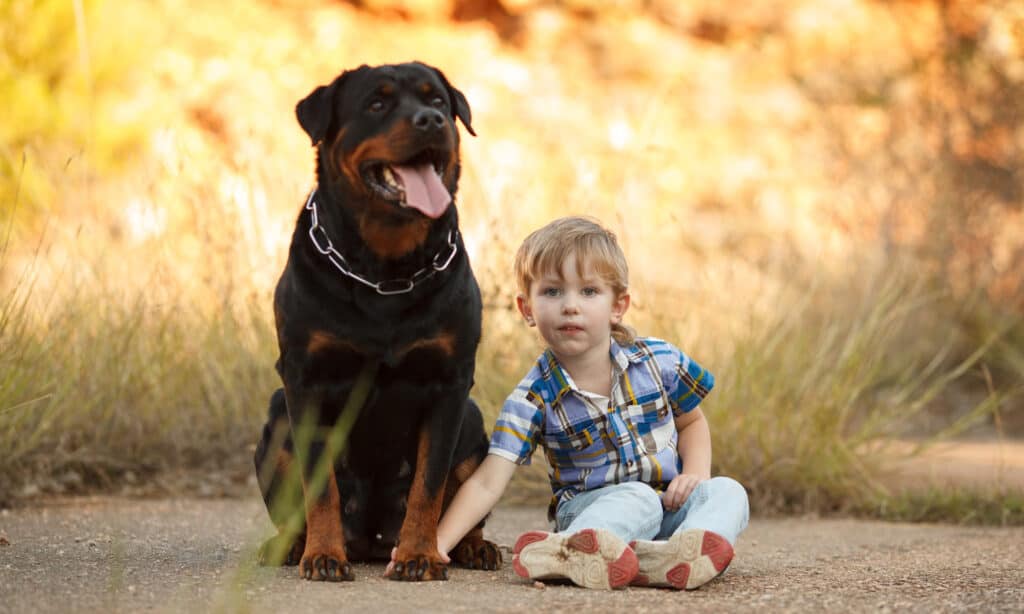
Diet and Underfeeding: The Impact on Your Rottweiler’s Weight
One of the most common reasons a Rottweiler may be underweight is due to diet and underfeeding. Ensuring your dog receives proper nutrition and an adequate amount of food is crucial for maintaining a healthy weight and overall well-being. Let’s explore the impact of diet and underfeeding on your Rottweiler’s weight and how to address these issues:
- Inadequate calorie intake: Rottweilers are a large, active breed with specific caloric needs based on their age, size, and activity level. If your dog isn’t receiving enough calories, they may struggle to maintain a healthy weight.
- Poor-quality food: Not all dog foods are created equal. Feeding your Rottweiler a low-quality diet can lead to malnutrition and weight loss. It’s essential to choose a high-quality, nutritionally balanced dog food formulated specifically for large breeds like Rottweilers. Look for foods with quality protein sources, healthy fats, and the right balance of vitamins and minerals.
- Feeding schedule: Establishing a consistent feeding schedule is vital for your Rottweiler’s health. Feeding your dog at regular intervals can help regulate their metabolism and ensure they’re receiving the proper amount of food. Adult Rottweilers typically do well with two meals per day, while puppies may require more frequent feedings.
- Food allergies or sensitivities: Some Rottweilers may have food allergies or sensitivities that can lead to digestive issues. This can make it difficult for them to maintain a healthy weight.
If you believe your Rottweiler’s weight loss is due to diet and underfeeding, it’s crucial to work with your veterinarian to develop a tailored feeding plan that meets your dog’s unique needs. By providing your Rottweiler with a nutritionally balanced diet and the appropriate amount of food, you can help them regain their lost weight and enjoy a healthier, happier life.
Parasites and Worms: How These Unwanted Guests Affect Your Dog’s Health
Parasites and worms are another potential cause of weight loss in your Rottweiler. These unwelcome invaders can wreak havoc on your dog’s health, leading to malnutrition, digestive issues, and a range of other problems. Let’s discuss the impact of parasites and worms on your dog’s health and what you can do to protect your Rottweiler:
- Common parasites and worms: Some of the most common internal parasites that can affect your Rottweiler’s weight include roundworms, hookworms, tapeworms, and whipworms. These parasites can rob your dog of vital nutrients, leading to weight loss and a variety of other health issues.
- Signs of infection: Symptoms of parasite or worm infestations can vary, but common signs include weight loss, diarrhea, vomiting, a pot-bellied appearance, and a dull, lifeless coat. If you notice any of these signs in your Rottweiler, it’s essential to consult your veterinarian for a proper diagnosis and treatment plan.
- Preventative care: Regularly administering a preventative deworming medication, as recommended by your veterinarian, is a crucial step in protecting your Rottweiler from parasites and worms. Additionally, maintaining a clean environment, promptly disposing of feces, and practicing good hygiene can help reduce the risk of infection.
- Treatment options: If your Rottweiler is diagnosed with a parasite or worm infestation, your veterinarian will recommend an appropriate deworming medication to eliminate the invaders. It’s essential to follow your vet’s guidance and administer the full course of treatment to ensure your dog’s health and well-being.
By being vigilant about parasite and worm prevention and seeking prompt treatment when necessary, you can help safeguard your Rottweiler’s health and ensure they maintain a healthy weight. Remember, a parasite-free dog is a happier, healthier dog.
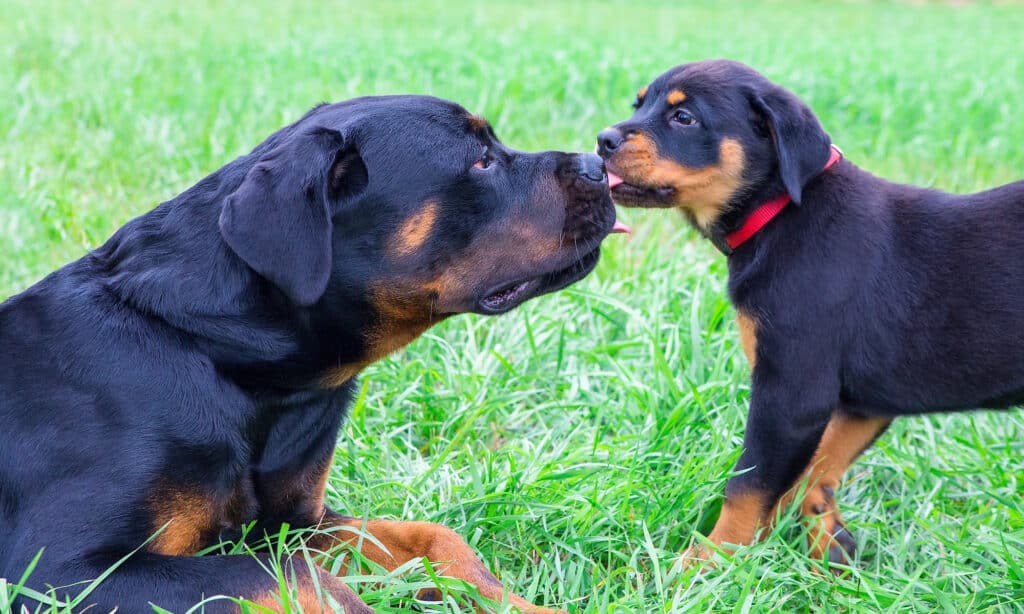
Common Illnesses and Diseases: Medical Reasons for Weight Loss
In some cases, an underlying medical condition may be the cause of your Rottweiler’s weight loss. It’s crucial to be aware of common illnesses and diseases that can affect your dog’s health and lead to weight loss. By identifying and addressing these issues promptly, you can help your Rottweiler regain a healthy weight and improve their overall well-being.
- Dental problems: Dental issues such as tooth decay, gum disease, or oral infections can make it painful for your Rottweiler to eat, resulting in weight loss.
- Digestive disorders: Conditions like inflammatory bowel disease, pancreatitis, or food intolerances can cause digestive upset and make it difficult for your Rottweiler to absorb nutrients, leading to weight loss.
- Kidney disease: Chronic kidney disease can affect your Rottweiler’s ability to process and retain nutrients, often leading to weight loss and other health issues. Early detection and management of kidney disease can help improve your dog’s quality of life and slow the progression of the condition.
- Diabetes: Diabetes mellitus is a common endocrine disorder in dogs that can result in weight loss despite a normal or increased appetite. If your Rottweiler displays symptoms such as increased thirst, frequent urination, and weight loss, consult your veterinarian.
- Cancer: Weight loss can sometimes be an early sign of cancer in dogs. If your Rottweiler experiences unexplained weight loss, lethargy, or other concerning symptoms, seek veterinary care as soon as possible.
It’s essential to work closely with your veterinarian if you suspect your Rottweiler’s weight loss is due to a medical condition. Early detection and appropriate treatment can make a significant difference in your dog’s prognosis and overall health. By staying vigilant and addressing any health concerns promptly, you can help your Rottweiler enjoy a long, happy life.
Stress and Anxiety: The Hidden Factors Behind a Skinny Rottweiler
While diet and medical issues are common causes of weight loss in Rottweilers, it’s also essential to consider the role of stress and anxiety in your dog’s overall health. Emotional factors can have a significant impact on your Rottweiler’s weight, as stress and anxiety can lead to changes in appetite and behavior.
- Identifying stressors: Common sources of stress for dogs include changes in routine, separation from their owner, loud noises, and conflicts with other pets. Pay attention to your Rottweiler’s behavior and environment to pinpoint any potential stressors that could be affecting their well-being.
- Loss of appetite: Stress and anxiety can cause some dogs to lose their appetite, resulting in weight loss. If your Rottweiler is refusing food or eating less than usual, consider whether stress might be the culprit and work on addressing the underlying issues.
- Comfort eating: On the other hand, some dogs may cope with stress by overeating, which can eventually lead to weight gain followed by rapid weight loss if the stressor is removed or resolved. Monitoring your dog’s food intake and adjusting their diet as needed can help prevent this pattern of weight fluctuation.
- Addressing stress and anxiety: To help your Rottweiler manage stress and anxiety, create a calm, consistent environment, establish a daily routine, and provide ample opportunities for exercise, mental stimulation, and social interaction. You may also consider consulting a professional dog trainer or behaviorist for guidance on helping your Rottweiler cope with stress and anxiety.
By recognizing and addressing the impact of stress and anxiety on your Rottweiler’s health, you can help them maintain a healthy weight and enjoy a happier, more balanced life. Remember, a happy dog is a healthy dog, so taking care of their emotional well-being is just as important as addressing their physical needs.
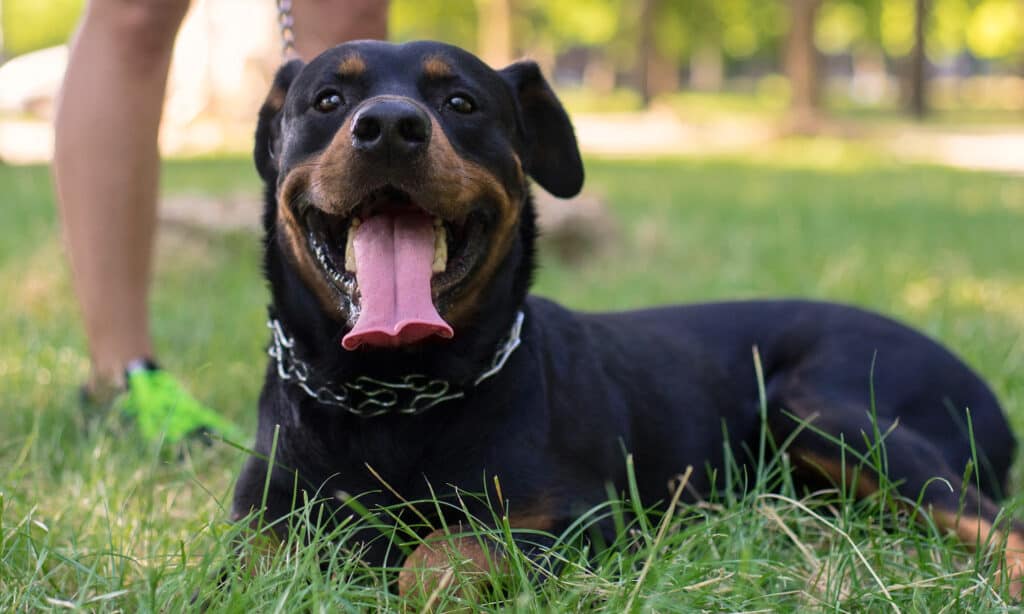
Helping Your Skinny Rottweiler Gain Weight: Tips and Strategies
If you’ve determined that your Rottweiler is indeed underweight and have identified the underlying cause, it’s time to help them regain a healthy weight. In this section, we’ll share practical tips and strategies to support your Rottweiler’s weight gain journey. Remember, it’s important to work closely with your veterinarian to develop a customized plan tailored to your dog’s unique needs and circumstances. With patience, persistence, and the right approach, you can help your skinny Rottweiler achieve their ideal weight and enjoy a healthier, happier life.
The Veterinarian’s Role: Consulting an Expert for Guidance
When it comes to helping your skinny Rottweiler gain weight, your veterinarian is an invaluable resource. They possess the knowledge and expertise needed to develop a personalized plan for your dog’s weight gain journey. They can also take into account their specific needs and health conditions. Let’s discuss the role of the veterinarian in guiding you through this process:
- Diagnosis and treatment: If your Rottweiler’s weight loss is due to an underlying medical issue, your veterinarian will provide a thorough examination, accurate diagnosis, and appropriate treatment plan. Addressing any health concerns is the first and most crucial step toward helping your dog regain a healthy weight.
- Nutritional advice: Your veterinarian can recommend a suitable diet for your Rottweiler based on their age, size, activity level, and any specific health requirements. They can also help you calculate the appropriate calorie intake and feeding schedule to ensure your dog is receiving adequate nutrition.
- Monitoring progress: Regular check-ups with your veterinarian are essential to track your Rottweiler’s weight gain progress and make any necessary adjustments to their diet or treatment plan.
- Ongoing support and advice: Throughout your Rottweiler’s weight gain journey, your veterinarian will be there to provide support, answer questions, and address any concerns that may arise. They can also offer guidance on exercise, enrichment, and stress reduction to promote your dog’s overall well-being.
By working closely with your veterinarian, you can ensure that your Rottweiler receives the expert care and guidance they need to gain weight safely and effectively. Remember, a healthy, happy Rottweiler starts with a strong partnership between you and your trusted veterinary professional.
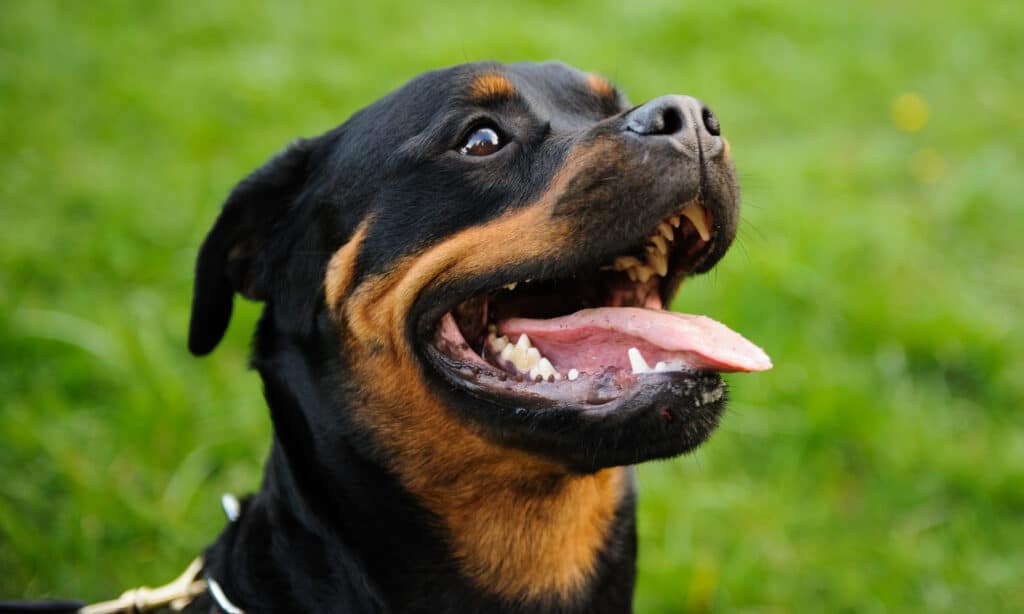
Nutritious Meals: Providing a Balanced, High-Quality Diet for Your Rottweiler
A balanced, high-quality diet plays a pivotal role in helping your Rottweiler gain weight and maintain optimal health. By providing your dog with nutritious meals that meet their unique needs, you can support their weight gain journey while promoting overall well-being. Let’s discuss how to choose and provide a well-rounded, high-quality diet for your Rottweiler:
- Choose the right food: Opt for a dog food specifically formulated for large breeds like Rottweilers. These foods contain the appropriate balance of protein, fat, and essential nutrients to support your dog’s growth, development, and overall health. Look for high-quality ingredients, such as real meat or fish as the primary protein source, and avoid artificial additives and fillers.
- Consider additional calories: If your Rottweiler needs to gain weight, your veterinarian may recommend increasing their calorie intake. This can be achieved by feeding a higher-calorie dog food or adding calorie-dense, nutritious supplements to their meals, such as fish oil, plain cooked eggs, or lean meats.
- Proper portion control: Overfeeding can lead to rapid weight gain and other health issues. It’s crucial to follow your veterinarian’s recommendations regarding portion sizes and feeding frequency. Measure your Rottweiler’s food carefully to ensure they’re receiving the right amount of calories to support healthy weight gain.
- Maintain a consistent feeding schedule: Establishing a regular feeding routine can help regulate your Rottweiler’s metabolism and promote weight gain. Adult Rottweilers typically do well with two meals per day, while puppies may require more frequent feedings.
By providing your Rottweiler with a balanced, high-quality diet, you can help them gain weight safely while promoting their overall health and well-being. Remember, a nutritious diet is the foundation of a healthy, happy dog, and it’s essential to work closely with your veterinarian to ensure your Rottweiler’s unique dietary needs are met.
Exercise and Muscle-Building Activities: Promoting Healthy Weight Gain
While providing your Rottweiler with a balanced diet is crucial for weight gain, it’s equally important to engage them in regular exercise and muscle-building activities. A well-rounded fitness routine can help your Rottweiler develop a strong, muscular physique while promoting healthy weight gain.
- Daily walks: Regular walks are essential for keeping your Rottweiler physically and mentally stimulated. Aim for at least one or two brisk walks each day. Ensure that your dog is walking at a steady pace and engaging their muscles.
- Playtime and interactive games: Engaging your Rottweiler in games like fetch, tug-of-war, or hide-and-seek can help build muscle while providing mental stimulation and bonding time. Look for durable toys designed for large breeds and make sure to monitor playtime to prevent any potential injuries.
- Strength-building exercises: Encourage your Rottweiler to engage in activities that help build muscle strength, such as swimming, stair climbing, or hill walking. These low-impact exercises can be especially beneficial for dogs that need to gain weight. They promote muscle growth without placing excessive strain on the joints.
- Obedience and agility training: Participating in obedience or agility training can provide your Rottweiler with physical exercise. It can also their confidence and mental focus. Look for local classes or trainers that offer sessions tailored to large breeds like Rottweilers.
- Monitor exercise intensity: While regular exercise is essential, it’s crucial not to overdo it, especially for an underweight Rottweiler. Start with gentle exercises and gradually increase the intensity as your dog gains strength and stamina.
By incorporating regular exercise and muscle-building activities into your Rottweiler’s daily routine, you can promote healthy weight gain and contribute to their overall well-being. Remember, a strong, fit Rottweiler is a happier, healthier dog, and a balanced approach to diet and exercise is key to achieving this goal.
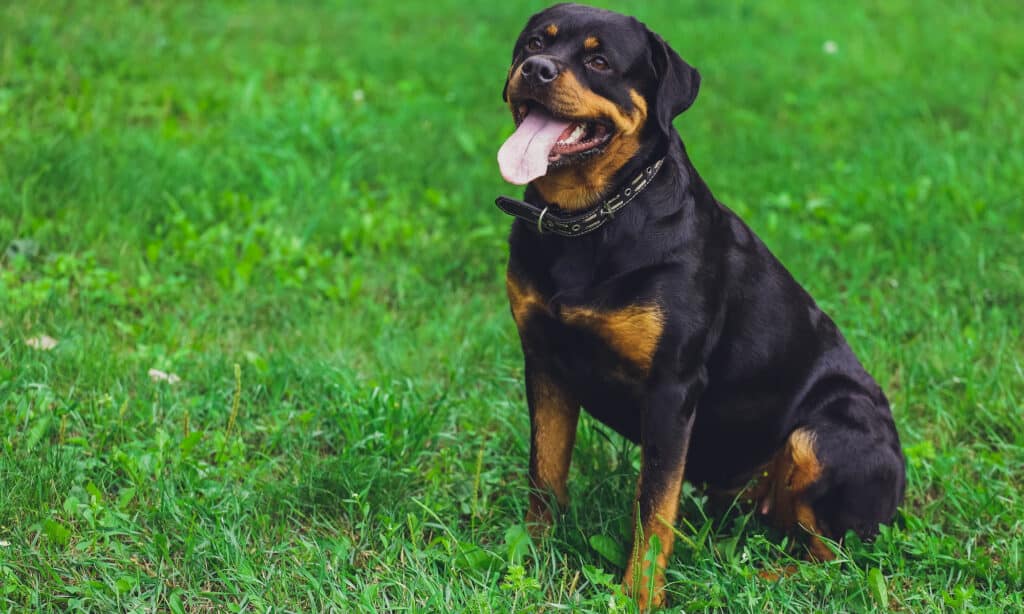
Weight Monitoring and Feeding Adjustments: Ensuring Your Rottweiler Thrives
Helping your Rottweiler gain weight requires ongoing attention and adjustments to ensure they’re progressing at a healthy pace. Regular weight monitoring and feeding adjustments are essential for keeping your dog on the right track and maintaining their overall well-being.
- Regular weigh-ins: Schedule regular weigh-ins for your Rottweiler, either at home using a reliable pet scale or during visits to your veterinarian. Consistent weight monitoring allows you to track your dog’s progress and make timely adjustments to their diet and exercise routine as needed.
- Body condition assessments: In addition to monitoring your Rottweiler’s weight, regularly assess their body condition using the Body Condition Score (BCS) system.
- Feeding adjustments: As your Rottweiler gains weight, their dietary needs may change. Work closely with your veterinarian to adjust your dog’s calorie intake and feeding schedule. This will ensure they continue to receive the appropriate nutrients and portion sizes for their current weight and activity level.
- Monitor for overfeeding: It’s essential to avoid overfeeding your Rottweiler. Rapid weight gain can lead to health problems like obesity and joint issues. Regular weigh-ins and body condition assessments can help you identify any signs of overfeeding. You can make necessary adjustments to your dog’s diet and exercise routine.
- Ongoing veterinary support: Throughout your Rottweiler’s weight gain journey, maintain a strong partnership with your veterinarian. They can provide valuable guidance, support, and expert advice to ensure your dog’s dietary and exercise needs are met and that their overall health is monitored.
By consistently monitoring your Rottweiler’s weight and making feeding adjustments as needed, you can help them thrive and achieve a healthy weight.
The Value of Regular Checkups and Preventative Care for Your Rottweiler
Ensuring your Rottweiler’s long-term health and well-being goes beyond addressing their immediate weight concerns. Regular checkups and preventative care are essential for maintaining your dog’s overall health, identifying potential issues early, and promoting a happy, fulfilling life. In this section, we’ll explore the importance of routine veterinary visits and preventative care measures for your Rottweiler. We will also discuss how these practices can help safeguard their health and contribute to a thriving, well-rounded lifestyle. By staying proactive and informed, you can play a vital role in helping your Rottweiler enjoy a healthy and happy life for years to come.
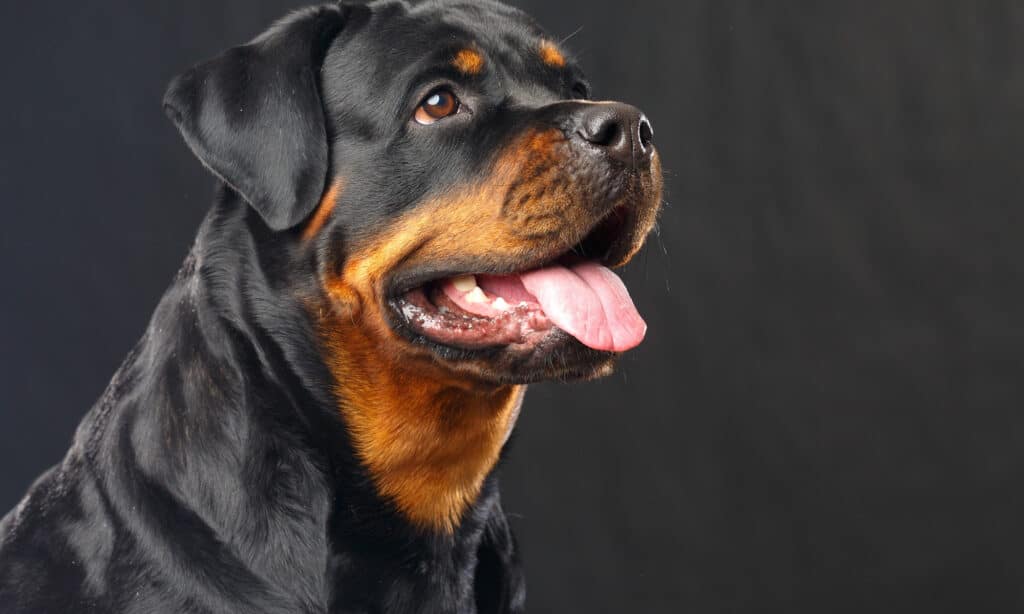
Scheduling Routine Vet Visits: A Key Aspect of Pet Wellness
Regular veterinary visits are crucial for maintaining your Rottweiler’s overall health and well-being. These checkups allow your veterinarian to assess your dog’s general condition and identify any potential health concerns. This can provide timely interventions to prevent or manage issues before they become more serious.
- Comprehensive health assessments: During a routine checkup, your veterinarian will perform a thorough physical examination, evaluating your dog’s body condition, coat, skin, eyes, ears, teeth, and more. These assessments provide valuable insights into your Rottweiler’s overall health and help identify any areas of concern.
- Early detection of health issues: Regular vet visits allow your veterinarian to detect potential health problems early, when they’re often easier to treat or manage. Early detection can result in more effective treatment plans, improved outcomes, and potentially lower healthcare costs.
- Preventative care measures: Routine checkups provide an opportunity for your veterinarian to administer necessary vaccinations, discuss parasite prevention, and recommend dental care or other preventative measures. This proactive approach can help protect your Rottweiler from common health risks and promote overall wellness.
- Nutritional guidance and weight management: Your veterinarian can offer expert advice on your Rottweiler’s diet. This ensures they receive the appropriate nutrients and calories to maintain a healthy weight.
- Building a relationship with your veterinarian: Consistent vet visits foster a strong, trusting relationship between you, your Rottweiler, and your veterinarian. This bond is crucial for ensuring your dog receives the best possible care throughout their life.
By scheduling routine vet visits for your Rottweiler, you’re taking a proactive approach to their health and well-being. Regular checkups and preventative care measures not only help maintain your dog’s overall wellness but also contribute to a happier, more fulfilling life for both you and your furry friend.
Early Detection: Monitoring for Signs of Illness in Your Rottweiler
As a responsible Rottweiler owner, it’s essential to keep a watchful eye on your dog’s health and well-being. Monitoring for signs of an illness can help you detect potential health issues early. This allows for more effective treatment and improved outcomes.
- Changes in appetite or weight: Sudden changes in your Rottweiler’s appetite or unexplained weight loss or gain can be indicators of underlying health issues. If you notice such changes, it’s essential to consult your veterinarian for an assessment.
- Gastrointestinal issues: Persistent vomiting, diarrhea, or constipation may signal potential health problems. While occasional digestive upsets can be normal, it’s important to consult your veterinarian if these issues persist or worsen.
- Lethargy and decreased activity: If your Rottweiler exhibits a sudden decrease in energy levels or becomes less interested in activities they once enjoyed, this could be a sign of illness or discomfort. Don’t hesitate to contact your vet if you observe these changes in your dog’s behavior.
- Skin or coat abnormalities: Rottweilers are prone to skin and coat issues, such as allergies, infections, or parasites. Be vigilant for symptoms like excessive itching, redness, hair loss, or the appearance of scabs or sores.
- Changes in breathing, coughing, or sneezing: Persistent coughing, sneezing, or difficulty breathing can indicate respiratory issues. These symptoms may require medical attention.
By monitoring your Rottweiler for signs of illness and seeking veterinary care at the first indication of a potential issue, you can help ensure that any health concerns are detected and addressed early.
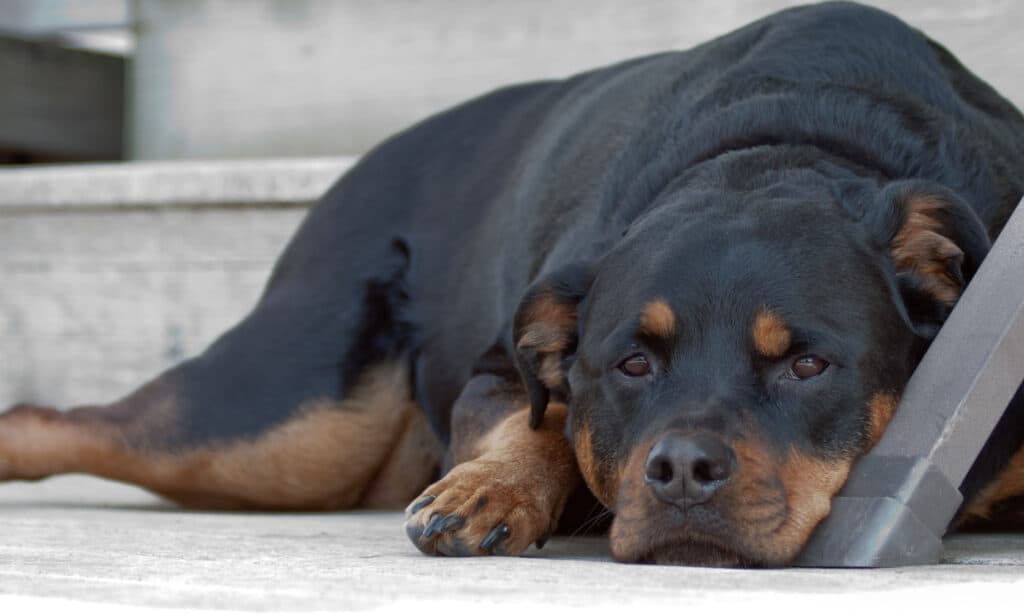
Vaccinations and Parasite Control: Crucial Steps for Protecting Your Dog’s Health
Ensuring your Rottweiler’s long-term health involves taking proactive measures to protect them from common illnesses and parasites. Vaccinations and parasite control play a crucial role in safeguarding your dog’s well-being and preventing potentially life-threatening health issues.
- Vaccinations: Vaccines are essential for protecting your Rottweiler from various infectious diseases, such as parvovirus, distemper, and rabies. Your veterinarian will recommend a vaccination schedule tailored to your dog’s age, health, and lifestyle. Adhering to this schedule is crucial for ensuring your Rottweiler remains protected throughout their life.
- Parasite control: Rottweilers, like all dogs, are susceptible to parasites such as fleas, ticks, and worms. These unwelcome guests can cause a range of health issues, from mild discomfort to severe, life-threatening conditions.
- Heartworm prevention: Heartworm disease, caused by a parasite transmitted through mosquito bites, can be fatal if left untreated. Regular heartworm prevention medication is essential for protecting your Rottweiler from this dangerous disease.
- Regular fecal exams: Fecal exams are an important tool for detecting and treating internal parasites like worms. These tests should be conducted regularly to ensure your dog remains parasite-free.
- Preventative care education: Stay informed about common parasites and diseases that can affect your Rottweiler. Understanding the risks, signs, and symptoms can help you take timely action to protect your dog’s health.
By prioritizing vaccinations and parasite control, you’re taking important steps to protect your Rottweiler’s health and well-being.
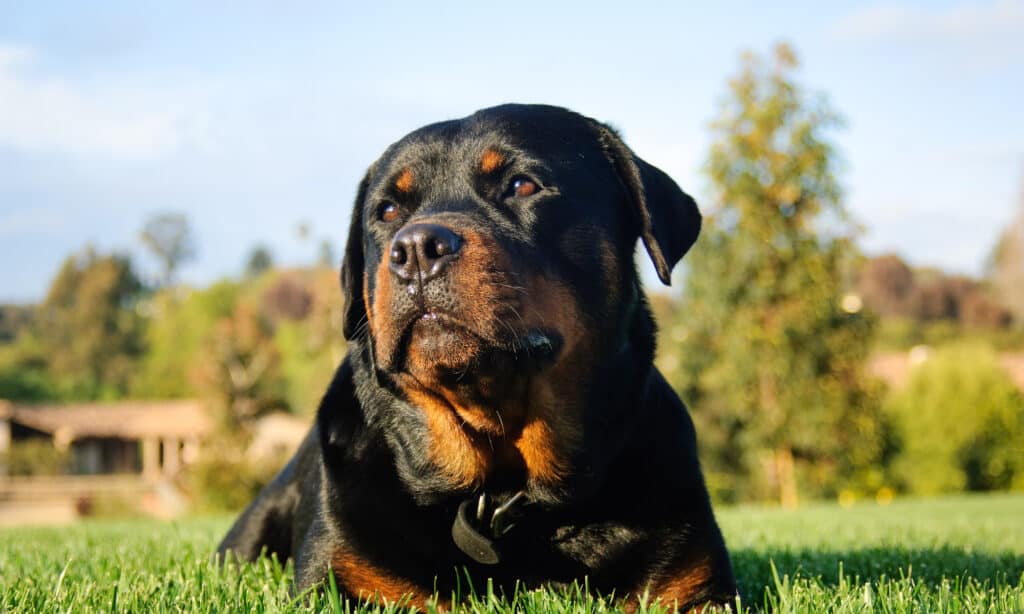
Conclusion: Committing to Your Rottweiler’s Health and Well-being
As a Rottweiler owner, your commitment to your dog’s health and well-being is vital for ensuring they enjoy a happy, thriving life by your side. From understanding the factors that contribute to their ideal weight to monitoring for signs of illness and taking proactive steps to prevent common health issues, your efforts play a crucial role in your Rottweiler’s overall wellness. By partnering with your veterinarian, providing a balanced diet, and maintaining a consistent routine of exercise and preventative care, you’re giving your Rottweiler the foundation they need to live their best life.
Remember, the journey to a healthy and happy Rottweiler doesn’t end with addressing their weight concerns. It’s an ongoing commitment that requires attention, care, and love throughout their life. By investing time and effort in your Rottweiler’s well-being, you’re not only enhancing their quality of life but also deepening the bond you share with your loyal, loving companion.
~Lindsie
